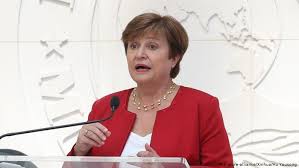The International Monetary Fund (IMF) has predicted that South Africa’s Gross Domestic Product (GDP) will briefly surpass Nigeria’s in 2024, thereby pushing Nigeria down from its current position as Africa’s largest economy.
The Bretton Woods institution, in its World Economic Outlook, projected that South Africa’s GDP would reach $401 billion by 2024 at current prices and surpass Nigeria’s estimated GDP of $395 billion and Egypt’s GDP of $358 billion.
The multilateral development finance institution, however, stated South Africa, currently the most industrialized nation in Africa, would claim the top position for just one year before falling behind Nigeria once more and subsequently slipping to third place behind Egypt by 2026, as outlined in the report.
It further projected that South Africa’s economy would grow by 0.9% this year and 1.8% in 2024, predicting that there’s the potential for even faster growth, ranging from 2.5% to 3%, provided South Africa addresses its power supply issues, resolves logistical bottlenecks, and implements other necessary reforms.
According to the report, Nigeria’s economy is expected to slow to 2.9% in 2023 from 3.3% in the previous year.
However, the IMF estimated the economy would grow by 3.1% in 2024 and attributed the slow growth trajectory to the effects of high inflation, which currently stands at 26.72% and has been in double digits since 2016.
Over the past few months, the President Tinubu-led administration has announced a wide range of policy reforms to boost Nigeria’s economic growth and most of the reform measures have received commendations from economic analysts from the international community.
However, the reforms are causing Nigerians pain as the Naira continues to depreciate in its exchange value for international currencies, especially the US dollar to which it has lost almost 50% of its value even as cost of fuel has risen by over 200%.
It would be recalled that Nigeria displaced South Africa to become Africa’s largest economy in 2014 after rebasing its GDP, which rose to just over $500 billion and improved its ranking as the 26th biggest economy globally then.
Both Nigeria and South Africa have been contending with various macroeconomic challenges in recent months, particularly electricity supply shortfall which is a recent occurrence in South Africa but has been a perennial problem in Nigeria.
Also, Nigeria has been facing challenges in raising her oil production, its primary foreign exchange (FX) earning source, thereby causing the country to meet its OPEC oil production quota for several months due to perennial crude oil theft in the Niger Delta region.






